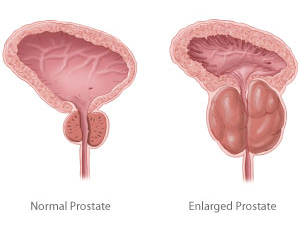Prostate Enlargement
 Overview
Overview
Prostate is a small gland that sits just above the rectum. It provides a good deal of the fluid in semen. As men age, the prostate gland grows larger, creating a condition called benign prostatic hypertrophy, or BPH. Ten percent of all men have some degree of prostate enlargement by age 40. By age 50, that number has grown to 50 percent and continues to increase as men get older.
But is this a cause for concern?
Symptoms
The tube through which urine passes in a male, called the urethra, is encircled by the prostate gland. As the prostate grows, it can pinch off the urethra, causing the symptoms of BPH. This makes it harder for the man to urinate with force, and many men suffering from BPH find it difficult to completely empty their bladder. One hallmark symptom of prostate enlargement is when a man must get up at night to urinate.
Prevention
Many naturalists believe that herbal treatments may work better for prostate enlargement than the most commonly prescribed surgical procedures.
Prescription drugs such as finasteride (Proscar) and terazpsom (Hytrin) have become very popular recently and continue to be big money makers for the pharmaceutical companies that make them. These drugs are the only pharmaceuticals approved to prevent prostatic proliferation, or the growth of new prostate cells that cause BPH in men who are over the age of 50.
Treatment
Herbal alternatives such as saw palmetto, licorice and pumpkin seeds are suggested by some naturalists. In the early 1990s, an alternative practitioner suggested his mixture of saw palmetto, licorice and pumpkin seeds, would do the same thing that Proscar does and that it was cheaper and probably safer.
Until Proscar and Hytrin were introduced, the only medically-recognized treatment for BPH was surgery. One procedure is known as transurethral resection of the prostate (TURP). TURP is the most common operation performed on men over 65. During a TURP, the urologist threads an instrument up the urethra and cuts away part of the prostate gland to enlarge the opening for the urethra, thus easing urine flow. TURP generally works well, but it is expensive and carries the usual risks of surgery, and recovery takes a week or two.
Proscar and Hytrin have been widely hailed as alternatives because they're cheaper and less traumatic than surgery. But herbs are cheaper still.
Proscar, especially, has definite drawbacks. Most men must take it for at least six months before any significant improvement becomes apparent. Fewer than half of men taking Proscar experience significant clinical improvement even after a year.
Proscar also has unwelcome side effects, including decreased libido, ejaculatory problems and erection loss. Herbs such as saw palmetto, licorice and pumpkin seeds are not reported to cause any of these problems.
Here are some details about the three herbs that may help this condition:
- Licorice contains a compound that prevents the conversion of testosterone to dihydrotestosterone. Taking very large doses of licorice for a long period of time can produce headache, lethargy, sodium and water retention, excessive loss of potassium and high blood pressure.
- Pumpkin seeds were the traditional treatment for BPH in Bulgaria, Turkey and the Ukraine. The recommendation was a handful of seeds a day throughout a male's adulthood. Pumpkin seeds contain chemicals called cucurbitacins that appear to prevent some transformation of testosterone into dihydrotestosterone. In addition, pumpkin seeds can contain as much as eight milligrams of zinc per half-cup serving.
- Saw palmetto is a small palm tree that grows in the south-eastern United States, particularly in Florida around the Everglades. Seminole Indians ate the saw palmetto seed as food; perhaps they noticed that it helped urinary problems. Whites adopted it as a diuretic to help flush excess water from the body, and over time it came to be used for BPH. It works because it contains a compound that inhibits the action of the enzyme (testosterone-5-alpha-reductase) that turns testosterone into dihydrotestosterone. Preventing this transformation of testosterone is also the way Proscar works, but saw palmetto does the job in a different and apparently more effective way.
- Stinging nettle. According to the results of another study, extracts of stinging nettle roots have successfully treated BPH. Researchers gave a few teaspoons of the extract daily to 67 men over age 60 with BPH and found that the herb significantly reduced their need to get up at night to urinate. The herb apparently has some inhibitory effect on the conversion of testosterone. German medical herbalists recommend two to three teaspoons of extract a day to treat BPH.
To make the blend mentioned above, place a half-cup or so of fresh pumpkin seeds in a blender or food processor. Open one saw palmetto capsule and pour in the contents, then add a few drops of licorice extract and blend until smooth. (Add a few drops of Brazil nut oil if you need to make the mixture a little more spreadable.) These ingredients are available in most health food shops. Use the blend like peanut butter and only make enough to last for a few days.
Posted in Prostate Enlargement
Ask a Question Or Join a Discussion


